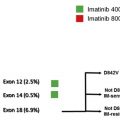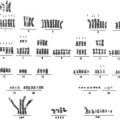Adjuvant imatinib prolongs recurrence-free survival and probably overall survival of patients who have undergone surgery for gastrointestinal stromal tumor (GIST). Estimation of the risk of recurrence with a prognostication tool and tumor mutation analysis is essential before imatinib initiation, because approximately 60% of patients with GIST with operable tumor are cured by surgery alone and some mutated tyrosine kinases are insensitive to imatinib. Adjuvant imatinib is usually administered for 3 years at the dose of 400 mg once daily. Early detection of tumors that recur despite adjuvant therapy with longitudinal imaging of the abdomen is likely beneficial.
Key points
- •
Approximately 60% of patients with operable gastrointestinal stromal tumor (GIST) are cured by surgery and are not candidates for adjuvant therapy.
- •
Several tools exist for estimation of the risk of recurrence, including risk-stratification schemes, prognostic heat maps, nomograms, and gene expression profiles.
- •
Adjuvant imatinib improves recurrence-free survival and probably overall survival of patients with GIST whose tumor harbors an imatinib-sensitive KIT or PDGFRA mutation.
- •
Most moderate-risk or high-risk patients may be treated after surgery with imatinib 400 mg daily for 3 years, but the optimal dose and treatment duration are unknown.
- •
Follow-up of patients is mandatory and should include longitudinal imaging of the abdomen and the pelvis to detect recurrence at a time when the tumor mass is still small.
Stay updated, free articles. Join our Telegram channel

Full access? Get Clinical Tree





